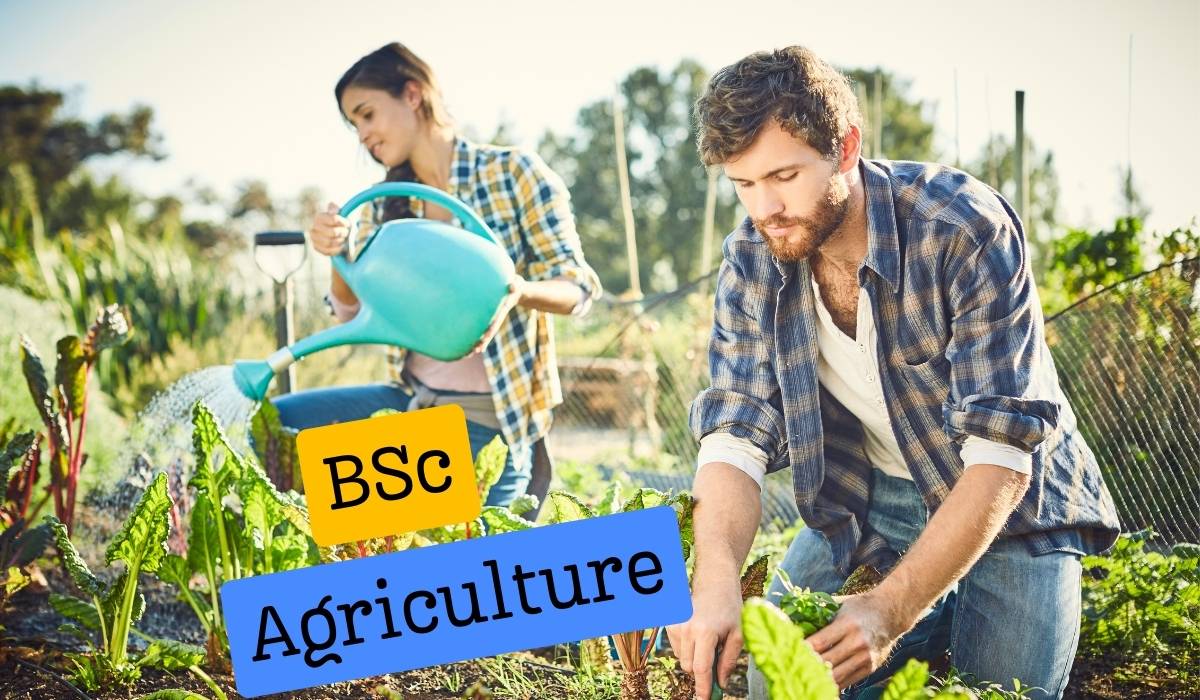Listing Overview
Agriculture, the backbone of the global economy, has evolved from traditional farming to a sophisticated, scientifically driven domain offering diverse career opportunities. The Bachelor of Science in Agriculture (BSc Agriculture) program embodies this transformation, equipping students with advanced knowledge and skills to tackle modern agricultural challenges such as food security, sustainability, and technological innovation.
What is BSc Agriculture?
The BSc Agriculture program combines theoretical knowledge with practical training across various agricultural disciplines, laying a strong foundation for careers or further studies in the sector. Here's what it entails:
Core Subjects:
- Agricultural Sciences: Comprehensive coverage of crop production, pest management, and agricultural economics.
- Soil Science: Principles of soil composition, fertility, and management to optimize crop yields.
- Water Resource Management: Sustainable practices for managing irrigation and conserving water resources.
- Animal and Poultry Management: Basics of livestock care, including health, nutrition, and breeding.
Technological Integration:
- Modern Techniques: Hands-on training with scientific equipment and methods.
- Precision Farming: Introduction to technologies like drones, AI, and IoT for efficient farming.
- Biotechnology: Concepts like genetic engineering and crop improvement for sustainable agriculture.
Reasons to Choose a Career in Agriculture
Agriculture offers dynamic opportunities for innovation, research, and impactful careers. Here's why it’s an ideal choice:
- Growing Demand:
- With the global population projected to reach 9.7 billion by 2050, the demand for food production is skyrocketing.
- Agriculture professionals play a vital role in ensuring food security for future generations.
- Technological Advancements:
- Precision farming, smart irrigation, and automation are transforming traditional practices.
- Skills in these technologies enhance efficiency and resource management.
- Sustainability & Climate Action:
- Climate change poses significant challenges, and sustainable agricultural practices are essential for mitigation.
- Professionals in this field contribute to environmental stewardship and conservation efforts.
- Entrepreneurial Ventures:
- Opportunities include agribusiness startups, organic farming, and innovative farming solutions.
- Entrepreneurs can create sustainable business models addressing market gaps.
- Global Relevance:
- Agriculture impacts food systems, rural economies, and livelihoods worldwide.
- Professionals in this sector make a direct contribution to community development and economic growth.
Eligibility Criteria for BSc Agriculture
Eligibility requirements vary across institutions, but general criteria include:
- Academic Qualifications:
- Completion of 10+2 with Physics, Chemistry, and Biology/Agriculture.
- Minimum aggregate score (typically 50%-60%, depending on the institution).
- Entrance Exams:
- National-level: ICAR AIEEA.
- State-level: KEAM, EAMCET, or institution-specific tests.
- Prepare well for these exams to secure admission to top colleges.
- Age Requirements:
- Some universities may have specific age limits for applicants.
Admission Process for BSc Agriculture
The admission process typically involves the following steps:
- Application Submission:
- Complete online applications on the respective college or university portals.
- Entrance Exam:
- Appear for national, state, or university-level exams.
- Counseling Sessions:
- Attend counseling sessions for merit-based seat allocation.
- Seats are assigned based on exam performance and eligibility.
Top Colleges for BSc Agriculture
Agricultural education plays a vital role in shaping the future of farming, food security, and sustainable practices. However, the quality of agricultural education varies across different institutions, making it essential for prospective students to choose a reliable and authoritative college to pursue their BSc Agriculture degree.
Here is a comprehensive list of some of the best agricultural colleges in India and abroad that offer high-quality education in BSc Agriculture.
Renowned Agricultural Colleges in India
- Punjab Agricultural University (PAU), Ludhiana
- Overview: PAU, established in 1962, is a leading agricultural university in India, known for its contributions to the Green Revolution. It offers a robust BSc Agriculture program, focusing on modern agricultural practices, research, and technology.
- Strength: Strong emphasis on crop production, agro-tech, and research.
- Tamil Nadu Agricultural University (TNAU), Coimbatore
- Overview: TNAU, founded in 1971, is renowned for its BSc Agriculture program, which offers hands-on experience in farming and exposure to cutting-edge agricultural technologies.
- Strength: Comprehensive curriculum combining theoretical knowledge with practical training.
- G.B. Pant University of Agriculture and Technology (GBPUAT), Pantnagar
- Overview: One of the oldest agricultural universities in India (1960), GBPUAT is known for its rigorous BSc Agriculture program that blends theoretical learning, practical training, and research opportunities.
- Strength: Pioneer of agricultural education in India, with a strong emphasis on research.
- University of Agricultural Sciences (UAS), Bangalore
- Overview: Established in 1964, UAS Bangalore is renowned for its quality education in agricultural sciences. The university’s BSc Agriculture program is recognized for its research-driven approach.
- Strength: Focus on sustainable agricultural practices and technology.
- Acharya N.G. Ranga Agricultural University (ANGRAU), Guntur
- Overview: Named after the father of the Indian peasant movement, ANGRAU offers a BSc Agriculture program with a strong research, extension, and technology focus.
- Strength: Comprehensive curriculum with a focus on agribusiness and innovation.
- Maharashtra Agriculture University (MAU), Rahuri
- Overview: Established in 1968, MAU is a prominent agricultural university in Maharashtra, offering a well-rounded BSc Agriculture program that integrates agriculture and allied sciences.
- Strength: Focus on regional agricultural needs, research, and extension.
- Chaudhary Charan Singh Haryana Agricultural University (CCSHAU), Hisar
- Overview: CCSHAU is one of Asia’s largest agricultural universities, founded in 1970. The university’s BSc Agriculture program is recognized for its relevance to modern agricultural practices.
- Strength: Strong focus on agronomy and agricultural economics.
- Kerala Agricultural University (KAU), Thrissur
- Overview: KAU, established in 1971, offers a specialized BSc Agriculture program focused on the unique ecological and agricultural needs of Kerala.
- Strength: Research in tropical agriculture, with a focus on sustainable practices.
- Orissa University of Agriculture and Technology (OUAT), Bhubaneswar
- Overview: Founded in 1962, OUAT offers a BSc Agriculture program known for its integration of theoretical knowledge with hands-on practical experience.
- Strength: Focus on improving agricultural productivity and sustainability.
- Banaras Hindu University (BHU), Varanasi
- Overview: BHU’s Institute of Agricultural Sciences offers a BSc Agriculture program that blends traditional agricultural knowledge with modern scientific practices.
- Strength: Holistic approach to education and research in agriculture.
- Junagadh Agricultural University (JAU), Junagadh
- Overview: JAU, located in Gujarat, offers a well-rounded BSc Agriculture program, integrating the latest technologies in agriculture to meet regional needs.
- Strength: Strong focus on plant sciences and agronomy.
- Anand Agricultural University (AAU), Anand
- Overview: AAU, situated in Gujarat, is known for its emphasis on research, extension, and agricultural education. The BSc Agriculture program is focused on innovation in agriculture.
- Strength: Strong academic foundation with emphasis on research-driven education.
- Navsari Agricultural University (NAU), Navsari
- Overview: NAU offers a BSc Agriculture program designed to integrate modern agricultural practices, research, and technology, preparing students to lead in the agricultural sector.
- Strength: Excellent focus on agricultural research and technology.
- Rajendra Agricultural University (RAU), Pusa, Bihar
- Overview: RAU, founded in 1970, provides a comprehensive BSc Agriculture program, combining research, education, and practical exposure to the latest in agricultural technologies.
- Strength: Emphasis on innovative agricultural practices and rural development.
- Assam Agricultural University (AAU), Jorhat
- Overview: As the first agricultural university in the Northeast, AAU offers a BSc Agriculture program that addresses the region’s unique agricultural challenges, with a focus on sustainability and productivity.
- Strength: Focus on regional agricultural needs and sustainable farming.
- Birsa Agricultural University (BAU), Ranchi
- Overview: BAU, located in Jharkhand, offers a BSc Agriculture program that focuses on local agricultural needs and sustainable practices for the region.
- Strength: Research and extension services tailored to regional agriculture.
- Sher-e-Kashmir University of Agricultural Sciences and Technology (SKUAST), Srinagar and Jammu
- Overview: SKUAST, with branches in Srinagar and Jammu, offers a BSc Agriculture program that integrates local agricultural knowledge with modern technologies.
- Strength: Strong research in temperate agriculture and horticulture.
- Banda University of Agriculture and Technology (BUAT), Banda
- Overview: BUAT offers a BSc Agriculture program focused on sustainable agricultural practices, research, and extension services.
- Strength: Focus on agricultural education and rural development.
- Rani Lakshmi Bai Central Agricultural University (RLBCAU), Jhansi
- Overview: This university, located in Jhansi, offers a BSc Agriculture program designed to address contemporary challenges in agriculture, focusing on sustainability.
- Strength: Strong focus on research and sustainable agriculture.
- Sardar Vallabhbhai Patel University of Agriculture and Technology (SVPUAT), Meerut
- Overview: Located in Meerut, Uttar Pradesh, SVPUAT offers a BSc Agriculture program focused on modern agricultural practices, sustainability, and technological innovations.
- Strength: Integration of innovative farming techniques and research.
- Dr. Rajendra Prasad Central Agricultural University (RPCAU), Pusa, Bihar
- Overview: RPCAU offers a BSc Agriculture program that emphasizes modern agriculture principles and sustainable practices, with an eye on rural development.
- Strength: Research-oriented program focusing on innovation in agriculture.
- Central Agricultural University (CAU), Imphal
- Overview: Located in Imphal, Manipur, CAU serves the North Eastern region and offers a BSc Agriculture program that addresses regional agricultural needs with a focus on sustainable practices.
- Strength: Focus on food security and rural development.
- Mahatma Phule Krishi Vidyapeeth (MPKV), Rahuri, Maharashtra
- Overview: MPKV offers a BSc Agriculture program combining theoretical knowledge with practical training. The university is known for its agricultural research and extension services.
- Strength: Focus on crop management, plant breeding, and agricultural extension.
- Bidhan Chandra Krishi Viswavidyalaya (BCKV), Mohanpur, West Bengal
- Overview: BCKV offers a BSc Agriculture program that integrates sustainable agricultural practices and technologies, focused on research and development.
- Strength: Strong emphasis on agricultural research and development.
- Kerala Veterinary and Agricultural Sciences University (KVASU), Wayanad
- Overview: Although primarily focused on veterinary sciences, KVASU offers a BSc Agriculture course that combines agricultural education with research in livestock and crop production.
- Strength: Integrated approach to agriculture and livestock management.
Internationally Recognized Agricultural Universities
Agriculture is a cornerstone of global food security and sustainability, and leading universities worldwide offer exceptional programs in agricultural sciences. Below is an updated and enriched list of the most prestigious agricultural institutions, supported by reliable insights:
- Wageningen University & Research, Netherlands
- Specialization: Renowned for its programs in life sciences, social sciences, and sustainable agriculture.
- Notable Achievements: Ranked consistently as the world’s top university for agriculture and forestry (QS World Rankings).
- University of California, Davis, USA
- Specialization: Environmental science and innovative agricultural technologies.
- Distinction: Ranked #1 in the U.S. for agricultural sciences.
- Swedish University of Agricultural Sciences, Sweden
- Specialization: Environmental sustainability and biodiversity.
- Unique Feature: Combines traditional agricultural knowledge with cutting-edge ecological research.
- AgroParisTech, France
- Specialization: Science, engineering, and management in agriculture.
- Highlight: Known as a Grande École, offering specialized programs in sustainable development.
- Cornell University, USA
- Specialization: Agribusiness, biotechnology, and sustainable food systems.
- Key Fact: Houses one of the most respected agricultural colleges globally—College of Agriculture and Life Sciences.
- ETH Zurich – Swiss Federal Institute of Technology Zurich, Switzerland
- Specialization: Agro-ecology and food systems.
- Global Standing: A top-ranked institution excelling in scientific research and innovation.
- China Agricultural University, Beijing, China
- Specialization: Forestry sciences and agricultural engineering.
- Regional Impact: A leader in food security research in Asia.
BSc Agriculture: Syllabus Overview
The BSc Agriculture curriculum provides a balance between theoretical learning and practical experience, preparing graduates for diverse roles in agriculture. Below is a detailed syllabus breakdown:
Core Subjects
- Agronomy
- Principles and practices of crop production.
- Practical Training: Soil testing and irrigation methods.
- Horticulture
- Cultivation of fruits, vegetables, and ornamental plants.
- Hands-On Learning: Greenhouse management and nursery techniques.
- Plant Pathology
- Study of diseases in plants and their management.
- Example: Managing fungal and bacterial infections in crops.
- Entomology
- Understanding pest biology and control strategies.
- Practical Work: Field surveys to monitor pest populations.
- Agricultural Economics
- Economic principles in agriculture, market analysis, and policies.
- Soil Science
- Study of soil properties, fertility, and conservation.
- Fieldwork: Soil sampling and fertility analysis.
- Animal Husbandry
- Focuses on livestock care, breeding, and health.
Learning Outcomes
Graduates will:
- Master Crop and Soil Management: Efficiently manage agricultural production using sustainable practices.
- Acquire Technological Skills: Use GIS and remote sensing for precision farming.
- Gain Industry Readiness: Apply theoretical knowledge in real-world scenarios through internships and fieldwork.
Course Structure
- Duration: Four years (Eight semesters).
- Modules: Each semester covers a mix of classroom learning, practical labs, and fieldwork.
- Specialization Opportunities: Final-year projects in areas like agro-robotics or organic farming.
Career Opportunities for BSc Agriculture Graduates
Employment Sectors
- Government Roles
- Positions in agronomy, agricultural economics, and policy-making.
- Example: Soil conservationist in national agricultural departments.
- Private Sector
- Seed Companies: Work as plant breeders.
- Food Processing Firms: Roles in quality control and research.
- Research and Development
- Opportunities in agricultural research institutes to develop new crop varieties.
Job Profiles
- Agronomist
- Focus: Optimizing crop production using sustainable methods.
- Soil Scientist
- Role: Improve soil health and fertility for better yields.
- Agricultural Engineer
- Role: Design and implement modern farming tools and technologies.
Emerging Career Paths
- Precision Agriculture Specialist: Utilizing AI and IoT for smarter farming practices.
- Climate-Smart Farming Expert: Developing strategies to mitigate climate impacts on agriculture.
Practical Training and Internships
BSc Agriculture programs emphasize experiential learning through internships and field training:
- Industry Partnerships: Internships with agribusinesses and seed companies.
- Government Agencies: Exposure to policy-making and extension services.
- Research Institutes: Hands-on research in plant genetics or pest management.
Job Profiles for BSc Agriculture Graduates
BSc Agriculture graduates have access to a wide array of career paths that contribute to diverse facets of the agriculture sector. These roles emphasize practical knowledge, research, and innovation.
- Agronomist
- Responsibilities: Optimizing crop production, managing soil health, and implementing sustainable farming practices to enhance agricultural productivity.
- Example: Agronomists working with companies like Bayer or Corteva help farmers adopt climate-resilient crops and sustainable irrigation techniques.
- Agricultural Research Scientist
- Roles: Conducting research to improve crop varieties, develop agricultural technologies, and address challenges such as pest resistance or climate change.
- Fact: According to the FAO, research innovations in agriculture have contributed to a 20% increase in global food production over the past decade.
- Plant Breeder
- Tasks: Developing resilient, high-yield crops using genetic modification and selective breeding.
- Highlight: Breakthroughs like drought-resistant wheat varieties have significantly impacted food security globally.
- Soil Scientist
- Duties: Analyzing soil composition to recommend sustainable farming practices. Soil scientists work closely with agronomists to combat soil degradation.
- Food Scientist
- Responsibilities: Ensuring food safety, developing nutritious food products, and improving packaging to reduce spoilage.
- Innovation: Food scientists at Nestlé are exploring fortification to combat malnutrition globally.
- Agricultural Engineer
- Tasks: Designing advanced machinery and systems to automate and improve farming operations.
- Example: Engineers developing GPS-guided tractors have increased precision and reduced fuel consumption by 30%.
- Agricultural Economist
- Roles: Analyzing market trends and policies to provide insights for better financial decisions in agribusiness.
- Stat: Agribusiness has grown into a $5 trillion global industry, making this role vital.
- Farm Manager
- Responsibilities: Overseeing daily farm operations, including resource allocation, livestock management, and budgeting.
Higher Education Opportunities for BSc Agriculture Graduates
- MSc in Agriculture
- Specializations include agronomy, horticulture, and agricultural economics, enabling graduates to delve deeper into specific fields.
- Fact: An MSc in Plant Pathology is essential for combating emerging crop diseases like wheat rust.
- MBA in Agribusiness
- Focus: Business aspects of agriculture, including supply chain management, marketing, and financial strategies.
- Insight: With the rise of e-commerce in agriculture, MBA graduates are leading tech-driven market solutions.
- PhD in Agricultural Sciences
- Pursue cutting-edge research and innovations, contributing to areas such as gene editing (CRISPR) or climate-smart agriculture.
- Example: Dr. Vandana Shiva’s work on seed sovereignty is a shining example of impactful agricultural research.
Entrepreneurship Opportunities in Agriculture
Agricultural entrepreneurship provides opportunities to blend innovation with profitability, driving change and sustainability in the sector.
- Starting a Farm
- Example: Entrepreneurs adopting vertical farming in urban areas are reducing resource use while meeting market demand.
- AgTech Startups
- Create apps or tools for crop monitoring, weather forecasting, and soil analysis.
- Example: Companies like CropIn have revolutionized precision farming in developing countries.
- Organic Farming Ventures
- Focus on eco-friendly practices to cater to the growing demand for organic products.
- Stat: Organic farming has seen a 15% CAGR globally, driven by consumer preferences.
- Value-Added Products
- Develop unique products such as organic jams or gluten-free flour.
- Learn how to create value-added agricultural products with our expert guide!
Challenges in Agriculture
Environmental Concerns
- Soil Degradation: Over 25% of arable land is at risk, reducing agricultural productivity.
- Water Scarcity: Sustainable irrigation systems like drip irrigation are vital.
Technological Adoption
- Limited access to IoT and AI tools for smallholder farmers.
- Solution: Initiatives like “Digital Green” help educate farmers on leveraging technology.
Market Challenges
- Price volatility and lack of direct market access affect farmer incomes. Blockchain-based supply chain systems offer transparency and fair pricing.
Technology in Agriculture
- AI and Machine Learning
- Predictive models improve yield estimation and pest management.
- Example: IBM’s Watson is transforming precision agriculture with AI-driven insights.
- IoT in Agriculture
- Sensors monitor soil moisture and nutrient levels in real time, optimizing water use.
- Drones
- Used for surveillance and targeted pesticide application.
- Fact: Drone use in agriculture is expected to grow by 32% annually.
Global Impact of Agriculture
- Economic Contribution: Agriculture accounts for 10% of global GDP and employs billions worldwide.
- Food Security: Innovations like genetically engineered crops are vital for feeding a growing population.
- Environmental Sustainability: Practices like agroforestry and carbon farming are aiding climate change mitigation.
Government Initiatives for Agriculture Education
- Scholarships: Financial aid for undergraduate and postgraduate programs.
- Vocational Training: Programs like “Skill India” provide hands-on training for rural youth.
- Partnerships: Collaborations with private players to align education with industry needs.
Studying Agriculture Abroad
Global Exposure
Exposure to Diverse Practices
Studying agriculture abroad provides students with firsthand exposure to diverse agricultural practices, techniques, and advanced technologies. It allows them to learn innovative approaches from different regions, including precision farming, sustainable agriculture, and agri-tech solutions.
International Perspective
Engaging with international students and faculty broadens students’ perspectives on agriculture. Collaborating in multicultural academic environments fosters a global outlook, enabling students to understand how agriculture adapts to varying climates, cultures, and market demands.
Advanced Research Facilities
State-of-the-Art Infrastructure
Renowned universities abroad, such as Wageningen University (Netherlands) and UC Davis (USA), offer cutting-edge laboratories and advanced research facilities. These enable hands-on experimentation and the practical application of theoretical knowledge.
Cutting-Edge Research
Studying abroad grants access to groundbreaking research in areas like crop genetics, sustainable farming methods, and agricultural biotechnology. For instance, institutions like Cornell University focus on reducing environmental impact through innovative agricultural techniques.
Diverse Academic Environment
Multicultural Learning
Immersing in a multicultural learning environment enhances cross-cultural understanding and collaboration. It fosters the exchange of ideas and best practices, making students adaptable to the global agriculture sector.
Interdisciplinary Approach
Universities abroad often adopt an interdisciplinary approach to agricultural studies, combining subjects like environmental science, economics, and technology. This prepares students for complex challenges in modern agriculture.
Popular Study Destinations
Netherlands
- Renowned Agricultural Universities: Known for prestigious institutions like Wageningen University, specializing in food security and sustainable farming.
- Focus on Sustainability: Aligns with global trends by integrating sustainable agricultural practices, precision farming, and resource optimization.
United States (USA)
- Varied Specializations: Offers a range of programs in agribusiness, crop science, and environmental management, with top universities like UC Davis and Cornell leading the way.
- Extensive Research Opportunities: Universities are hubs for innovation, with a focus on robotics in agriculture, drought-resistant crops, and advanced irrigation systems.
Australia
- Agricultural Innovation Hub: Australian universities excel in research on water conservation, climate-resilient crops, and advanced livestock management.
- Strong Agricultural Sector: With a robust industry, students gain real-world exposure to modern farming practices and agribusiness strategies.
Financial Aid and Scholarships for BSc Agriculture
Merit-Based Scholarships
- Academic Excellence: Scholarships recognize outstanding academic performance. Examples include the Holland Scholarship and the Fulbright Program.
- Support for Talent: Encourages students with exceptional skills in agricultural sciences to excel further.
Need-Based Financial Aid
- Inclusivity in Education: Financial aid ensures accessibility for students from diverse economic backgrounds. For example, the Australia Awards prioritize economic need alongside academic merit.
Government Scholarships
- State and National Support: Programs like DAAD (Germany) and Chevening (UK) support international students in agricultural studies.
- Eligibility Criteria: Scholarships are typically awarded based on academic records and financial need.
University-Specific Scholarships
- Institutional Support: Institutions like Wageningen University and Cornell offer dedicated scholarships for international agriculture students.
- Research Grants: Funding is often available for students engaged in impactful research projects.
Private Sector Sponsorships
- Corporate Scholarships: Organizations like Syngenta and Bayer fund agricultural education to nurture a skilled workforce.
- Industry Collaboration: Programs align with industry trends, offering practical benefits like internships or mentorship.
International Scholarships
- Global Opportunities: Options include the Erasmus+ program in Europe and the Fulbright Program in the USA.
- Collaboration and Exchange: Universities often partner with global organizations to enhance scholarship opportunities.
Language Proficiency
English as a Medium of Instruction
Most agriculture programs abroad are taught in English, making it accessible to international students. Proficiency in English is essential for admissions and academic success.
Language Learning Opportunities
Studying in an English-speaking country allows students to improve their language skills while integrating into local cultures, enhancing both personal and professional growth.
Networking Opportunities
Industry Connections
Studying abroad offers opportunities to network with professionals, researchers, and experts in the global agricultural industry. For instance, alumni events and industry conferences help students establish valuable connections.
Alumni Networks
International alumni networks provide mentorship and career opportunities, creating pathways for students to succeed in the global market.
Cultural Enrichment
Cultural Exchange
Living in a new country offers rich cultural experiences, fostering adaptability and personal growth. Exposure to different lifestyles broadens perspectives and improves global awareness.
Global Perspectives
Understanding diverse cultures and agricultural practices enhances problem-solving skills, making students versatile professionals in the global market.
Take The Next Step
- Explore Top Agricultural Programs: Start researching programs at globally ranked institutions like Wageningen University, Cornell University, or UC Davis.
- Discover Scholarships: Visit platforms like DAAD, Fulbright, or Erasmus+ to find scholarships that suit your academic and financial needs.
- Plan Your Journey: Connect with educational advisors to tailor your study abroad experience in agriculture.
Conclusion
Studying agriculture abroad is an enriching journey that combines advanced learning, cultural exposure, and career development. With access to state-of-the-art facilities, cutting-edge research, and a multicultural environment, students can gain the skills needed to tackle global challenges in sustainable agriculture. Financial aid and scholarships ensure that quality education is within reach for all aspiring agricultural professionals.
Ready to shape the future of agriculture? Start exploring scholarship opportunities and top universities today!




